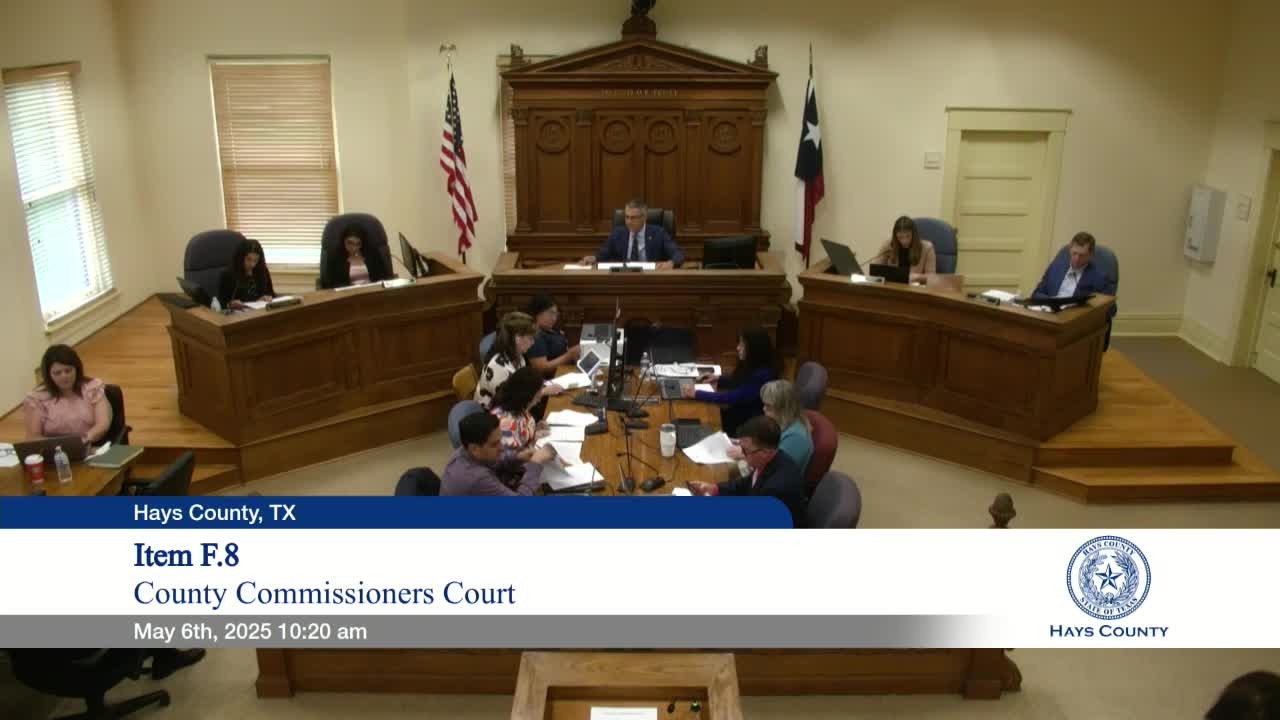Court debates mental‑health diversion center design and approves 16 correctional officer hires to bring inmates back to Hays County
Get AI-powered insights, summaries, and transcripts
Subscribe
Summary
Judges and commissioners discussed plans to expand a diversion center and modify jail master plans; the court approved hiring 16 correctional officers to prepare for returning outsourced inmates and tabled immediate design contracting for further stakeholder input.
Hays County Commissioners Court spent substantial time May 13 discussing plans to expand mental‑health treatment capacity and the county jail footprint, and separately approved hiring 16 correctional officers to prepare for returning inmates currently housed out of county.
No final contract was authorized for architectural work on a proposed diversion center or jail master‑plan changes. Judge Ruben Becerra and several commissioners said they want more input from the Behavioral Advisory Team, the sheriff’s office and mental‑health experts about the diversion center’s location and design before authorizing additional design work.
What the court did vote on - The court approved a request to hire 16 correctional officers, effective May 1, 2025, to prepare for returning inmates to the Hays County Jail. The sheriff’s office presented the staffing request as necessary to incrementally bring outsourced inmates back as jail capacity and staffing allow. A roll‑call vote recorded all members in favor; the motion passed.
Discussion: diversion center, jail expansion and procurement Commissioners and County Judge Elaine Brown endorsed creating a diversion or evaluation center to keep people in crisis out of jail and provide 24/7 treatment. But several commissioners, and multiple outside mental‑health providers who participate in the Behavioral Advisory Team (BAT), warned against automatically locating a diversion center inside the jail footprint.
- Judge Elaine Brown said the county “does have a real need” for a crisis/evaluation/diversion center but that “we still need to have conversations” about what the center should look like and where it should be housed. - Commissioner Tucker Smith (remarks summarized) and multiple mental‑health experts cautioned that placing a diversion center at the jail — or routing people in crisis through law‑enforcement booking — could escalate situations and run counter to diversion goals. Several BAT members told the court they were not consulted before the item appeared on the agenda and urged more stakeholder engagement.
Procurement and architect (HOK) questions The agenda item, as described at the meeting, sought authority to negotiate an architectural/engineering (AE) agreement with HOK, the county’s existing architect for the master plan. County Purchasing Agent Stephanie Hemp told the court HOK’s original contract tied to a bond project does not permit automatic extension for engineering services; any new AE work with HOK would require a new professional services agreement executed under Texas Government Code procurement rules (Chapter 2254 for professional services). Hemp said engineering services would need to come from the county’s engineering services pool, but HOK could be engaged for architectural work through a new agreement.
Public comment and email support An emailed public comment from a local advocate urged the court to authorize the AE design contract and cited other Texas counties’ diversion center models (Tarrant, Travis) as precedents. The judge said the item would be tabled and reworked with clearer language and procurement guidance; staff will return with a more articulated road map for next steps.
Relation to jail operations and staffing Sheriff Anthony Hippolito and Chief Deputy Brett Bailey told the court they want to return outsourced inmates to Hays County, and that staffing is a major constraint. The approved hire of 16 correctional officers was presented as an incremental step to increase in‑county housing capacity; the sheriff’s office said additional beds are expected to become available later this year and incremental hiring will allow phased returns from contracts with out‑of‑county facilities.
What the court directed - Table the AE authorization as written and return with revised procurement language and a stakeholder engagement plan. The judge asked county staff to consult with Purchasing and present a clearer proposal. - Approved immediate hiring of 16 correctional officers to support returning inmates.
Ending Commissioners emphasized that the diversion center concept remains a priority but said they want the plan shaped by practitioners — the BAT, county courts, mental‑health providers and the sheriff — before committing to an AE contract or a specific location.
